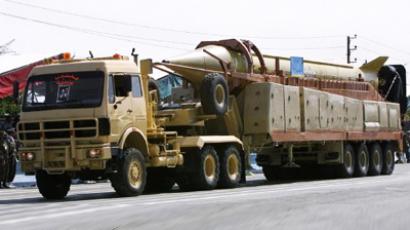Hopes for new Korean thaw
A senior North Korean diplomat has arrived in New York in an attempt to revive long-stalled talks over his country's controversial nuclear program. This follows the first meeting between top diplomats from the North and South in two years.
The DPRK’s First Deputy Foreign Minister Kim Kye-gwan is to discus in New York the steps needed for the nuclear talks to resume.Earlier in 2005 the senior diplomat represented the North during the fourth round of talks, which ended in a joint declaration, in which Pyongyang agreed to scrap its nuclear facilities in exchange for economic aid.The moves come just days after top envoys from the two Koreas sat together for the first time in over two years on the sidelines of a security summit in Indonesia.Last Friday, South Korean Foreign Minister Kim Sung-hwan and his North Korean counterpart Park Ui-choon agreed to renew six-party talks over Pyongyang's atomic ambitions. Nuclear negotiators Wi Sung-lac and Ri Yong-ho from the Seoul and Pyongyang respectively also met on the day to discuss details of the future negotiations.After the meeting South Korea agreed to renew food supply to the North, according to southern media. Seoul has given the green light to sending 300 tonnes of flour. The South was a major source of food aid for the North during the time the two nations were going closer. However the new conservative government of Lee Myung-bak, which came to power in South Korea in 2008, retracted the advances and took a much firmer position towards Pyongyang.Six-party talks were halted after North Korea sank a navy ship from the South, killing 46 sailors, and shelled Yeonpyeong Island, killing four people.While the latest move have been taken with cautious optimism by many observers, US Secretary of State Hilary Clinton says before any deal is discussed, North Korea must first dismantle its nuclear facilities.Eric Sirotkin, cofounder of the National Campaign to End the Korean War, says there are several reasons the two countries have agreed to renew talks after a long period of stagnation.“We are heading into new elections next year in South Korea, certainly that could be one of the reasons,” he stated. “South Koreans have taken a very hard line against the North, and currently the US as well. What we are seeing now for the first time is both South Korea and Washington beginning to move again back the to negotiating table. And we hope that is a good sign.”According to Sirotkin, North Korea indicated many times it would give up its nuclear weapon capability for a peace treaty or formalization of relations with the US.“That has always been on the table. It is a real opportunity, because more than 150 countries normalized relations with the North and we need formal channels to begin to deal with these things,” explained Sirotkin. He also stated that the fact North Korea has been invited to Washington to discuss cooperation is a good sign.“North Koreans have always wanted bilateral talks; it was the US that separated Korea more than 60 years ago,” concluded Sirotkin. “The US holds the key to peace in the region, and now it is time for Washington and North Korea to be dialoguing.”Pepe Escobar, an Asia Times Correspondent, told RT Pyongyang will not surrender its nuclear arsenal until it is at least no longer formally at war with the South and with America.“First you have to end the war. From the North Korean point of view it’s a war against America. They view South Korea as a puppet government. In the eye of Pyongyang, South Korea is still occupied by the American troops – there are 36,000 to 38,000 US troops there. Unless you start ironing out this basic difference, it’s absolutely impossible to even start talking,” he believes.
Meanwhile, South Korea and the US are planning joint military drills in disputed seas next month, which North Korea always finds provocative. Hyun Lee from the Campaign to End the Korean War believes the US use military exercises in the region to disguise their real goal, which is to stop China’s expansion.“The US military needs justification to maintain its troops in the region, so it can pursue its real interest, which is to contain China’s expansion of power, and also to continue selling its weapon systems – and demonizing North Korea as an axis of evil country conveniently provides that kind of justification,” she said.















